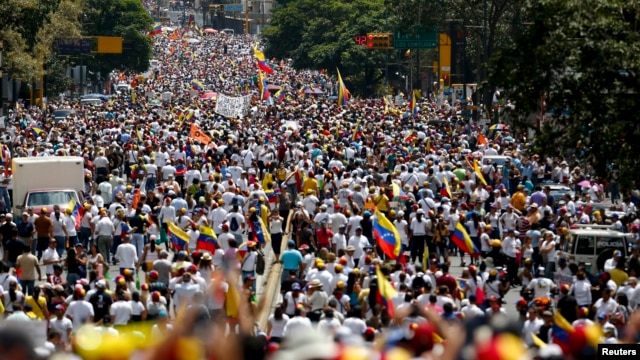
Opposition supporters march protest against Nicolas Maduro's government in Caracas, Venezuela, Feb. 22, 2014.
Supporters and opponents of Venezuelan President Nicolas Maduro held rival marches Saturday in Caracas as he summoned all sides to what he described as a peace conference in the coming days.
Opponents of Maduro began marching earlier this month against his government. They say they are tired of out-of-control crime and shortages in supermarkets in an oil-rich nation.
Thousands of Maduro backers held a counter-demonstration, saying he is the democratically-elected leader. His wife, Cilia Flores, described the opposition as "fascists."
Meanwhile, Maduro is calling on all sides to join him for peace talks Wednesday.
Late Friday, Maduro invited U.S. President Barack Obama to meet him for talks and condemned U.S. Secretary of State John Kerry as "arrogant" and "insolent" for criticizing the Venezuelan government's use of force against opposition protesters.
In a statement Friday, Secretary Kerry called on the Maduro government to step back from "its efforts to stifle dissent through force" and respect basic human rights. He also said every government has a duty to maintain public order, and all sides, including the opposition protesters, must refrain from violence.
Protest-related violence has killed 10 people and injured more than 100 others.
President Maduro says the demonstrations are part of a right-wing attempt to topple his socialist government. He accuses the United States and international media outlets of supporting the opposition — a charge the State Department denies. He also revoked the accreditation of CNN reporters covering protests and ordered them to leave the country.
The protests began February 2 in the western city of San Cristobal, led by students angry over the soaring crime rate. Protests quickly spread to Caracas and other major cities, and intensified over the past two weeks.
Venezuela has the world's largest proven oil reserves, but under Maduro and his predecessor, the late Hugo Chavez, the economy has declined, street crime is common, and corruption is widespread. |
|
